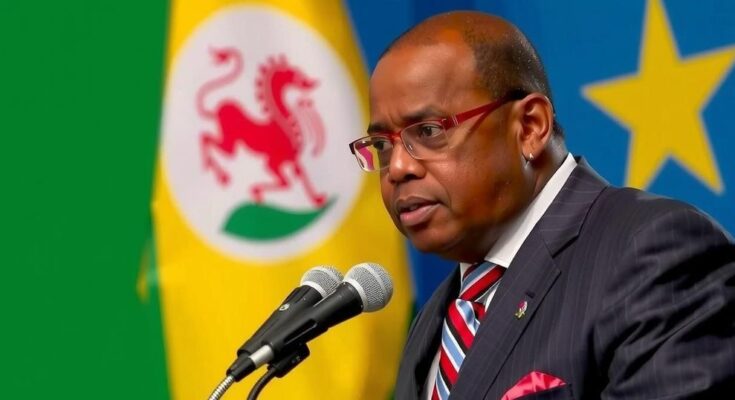Guinea Bissau’s President Umaro Sissoco Embalo has indefinitely postponed the legislative elections originally set for November 24. This decision follows armed conflicts that led him to dissolve parliament in December 2023. The postponement reflects institutional instability, logistical issues, and a lack of funding, with no new election date announced yet.
On Monday, Umaro Sissoco Embalo, President of Guinea Bissau, announced an indefinite postponement of the legislative elections initially set for November 24. This decision extends a prolonged period of political uncertainty in the West African nation, a situation that worsened following the president’s dissolution of parliament in December 2023 after armed clashes which he described as an attempted coup. The postponement reflects the ongoing instability that has hindered political progress in the country, as indicated by multiple warnings regarding logistical and financial challenges that could prevent the elections from proceeding as planned. Mr. Embalo’s earlier declaration of the November election date had raised hopes for a resolution to the political crisis. However, the minister for territorial administration, Aristides Ocante da Silva, had signaled on November 1 that a postponement was likely due to serious logistical constraints. This statement led to a weekend announcement by Mr. Embalo that he would formalize the postponement shortly thereafter. The president subsequently revoked the July 2024 decree that had scheduled the upcoming elections. At present, no new date for the elections has been set, with Mr. Silva confirming that it would be established in a future decree. The uncertainty surrounding the legislative elections is mirrored by concerns over the upcoming presidential election, during which Mr. Embalo’s position as head of state is to be contested. The political landscape is further complicated by a coalition opposing Mr. Embalo, which has held a majority in parliament since June 2023 elections, leading to heightened institutional conflicts. Guinea Bissau, one of the world’s poorest nations, continues to grapple with the repercussions of its history marked by coups and corruption. Despite some advancements toward constitutional order over the last decade, the political atmosphere remains volatile, particularly following Mr. Embalo’s contentious election in December 2019, with questions surrounding his term and the scheduling of future elections still unresolved.
Guinea Bissau’s political scene has been characterized by instability since its independence from Portugal, especially as the nation has experienced numerous coups and prolonged periods of governance challenges. After being elected president in December 2019, Mr. Embalo has faced mounting opposition, particularly from the PAIGC party, which has complicated the legislative and presidential election processes. The country has struggled to maintain a functional political environment while relying on external financial support for its electoral processes, further exacerbated by persisting economic hardships.
The indefinite postponement of legislative elections in Guinea Bissau underscores the persistent political instability that hampers the country’s governance and development. President Embalo’s decision highlights significant logistical and financial barriers to conducting elections amid ongoing tensions with opposition factions. As the nation simultaneously grapples with the need for a presidential election, the future of Guinea Bissau’s political landscape remains uncertain, demanding urgent attention to reinstate constitutional order and ensure fair democratic processes.
Original Source: punchng.com




